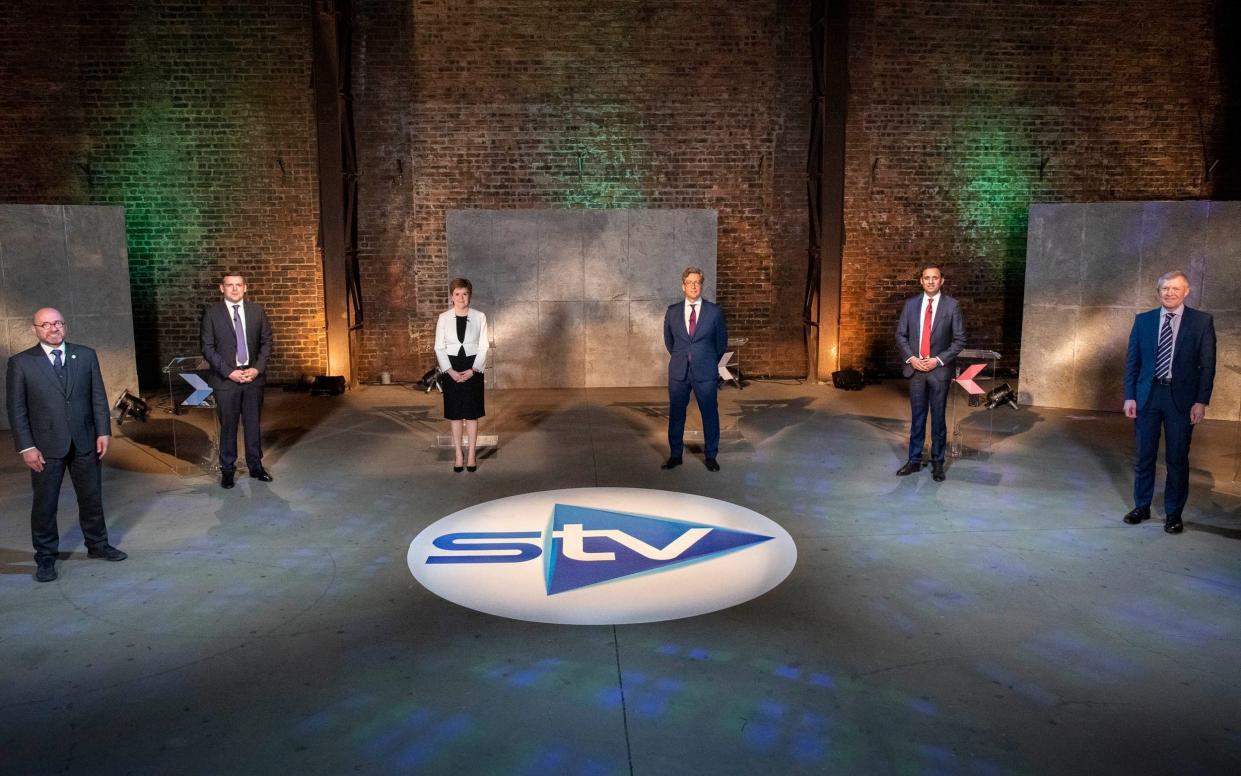End of North Sea oil industry within a decade 'is Green price for coalition deal with SNP'

The end of North Sea oil and gas production within a decade could be the Scottish Greens' price for joining the SNP in coalition after next month's Holyrood election, a TV debate has heard.
Douglas Ross, the Scottish Tory leader, challenged Patrick Harvie, the co-leader of the Scottish Greens, over a potential coalition with the SNP after May’s election and what it would mean for thousands of workers in the oil and gas sector.
There is speculation that Nicola Sturgeon is keen to seek a formal agreement with the party in an effort to boost her environmental credentials ahead of the COP 26 UN Summit in Glasgow in November, which would see Mr Harvie’s party handed ministerial posts.
Mr Harvie did not deny Mr Ross’s claim that calling for an end to North Sea oil and gas production would be his price for a deal with the SNP. Challenged over a timeframe, he suggested the industry should stop within a decade.
The STV debate also heard accusations that Nicola Sturgeon is determined to divide Scotland again over independence and reopen wounds from the 2014 referendum rather than focusing on recovery from the pandemic.
Watch: Scottish leaders face off in second TV debate
The First Minister insisted it was possible for her government to simultaneously focus on helping businesses, schools and society recover from the trauma caused by Covid and a campaign to leave the United Kingdom.
Ms Sturgeon has said she wants a referendum by the end of 2023, after world leaders have stopped announcing mass deaths every day but during the recovery from the largest recession in centuries.
But Holyrood's Unionist parties said all sides needed to come together to focus on recovery and this could not happen if they were instead at loggerheads over separation.
The debate was staged ahead of postal vote ballot papers starting to arrive on doorsteps on Wednesday. They will play a particularly important role in determining the outcome of the election, with more voters choosing to avoid polling stations during the pandemic.
The Electoral Commission said more than a million people have registered to vote by post in the May 6 electorate, a record total and nearly a quarter of the electorate.
Opinion polls have indicated Ms Sturgeon is on the cusp of winning an overall majority but may require the support of the pro-independence Greens if she falls short. They unveil their manifesto on Wednesday morning.
How the Scottish Parliament might shape up if the new @STVNews / @IpsosMORIScot poll is replicated at the ballot boxes on May 6: https://t.co/ABLhQZ5yvL pic.twitter.com/L0auU6WGpK
— STV News (@STVNews) April 7, 2021
Pressed by Mr Ross about his price for joining a nationalist coalition with the SNP, Mr Harvie said: “We are the only political party to recognise that the world has about three times as much oil and gas than we can ever afford to burn, and that includes the North Sea.
"We need to end new exploration licences, stop going looking for more because we have more than we need already, revoke the undeveolped ones and over the next 10 years, yes, we should be investing in sustainable industries of the future that will create jobs, that will last for the next generation without trashing the natural world around us.”
Mr Ross said Mr Harvie had confirmed that “in the course of the next two Parliaments the Scottish Greens want to halt production of North Sea oil and gas that would cost over 100,000 jobs in the north east and right across Scotland".
Mr Harvie said the end of the fossil fuel age "had to come" as it was "our only route to survival". Asked for his message to the tens of thousands of workers whose jobs would be at risk, he suggested parties would be misleading people to suggest the jobs could "last forever".

In her opening remarks, Ms Sturgeon said: "By giving both votes to the SNP, you will secure leadership through Covid, a plan for recovery and, when the crisis is over, the choice of a better future with independence."
But Mr Ross said: "What is reckless is suggesting you could have a referendum and a campaign to separate Scotland from the rest of the UK in a recovery phase and you can't have both - you can't have a recovery and a referendum."
Mr Rennie said: "We won't be able to do that if we are divided and arguing over independence because we know what happened last time. There was a brutal argument that went on for three years that divided families and neighbours from each other, and it was poisonous."
Ms Sturgeon also came under pressure over her record on domestic issues such as health and education. Mr Rennie pressed her on her failure to come close to closing the educational attainment gap - which she claimed would be her "defining mission".
The First Minister insisted that her government had made progress, however, Mr Rennie said that at current rates, it would take three and a half decades to achieve her goal.
Watch: Why life has been ‘extremely challenging’ on the Scottish islands with just 70 COVID cases

 Yahoo News
Yahoo News 
